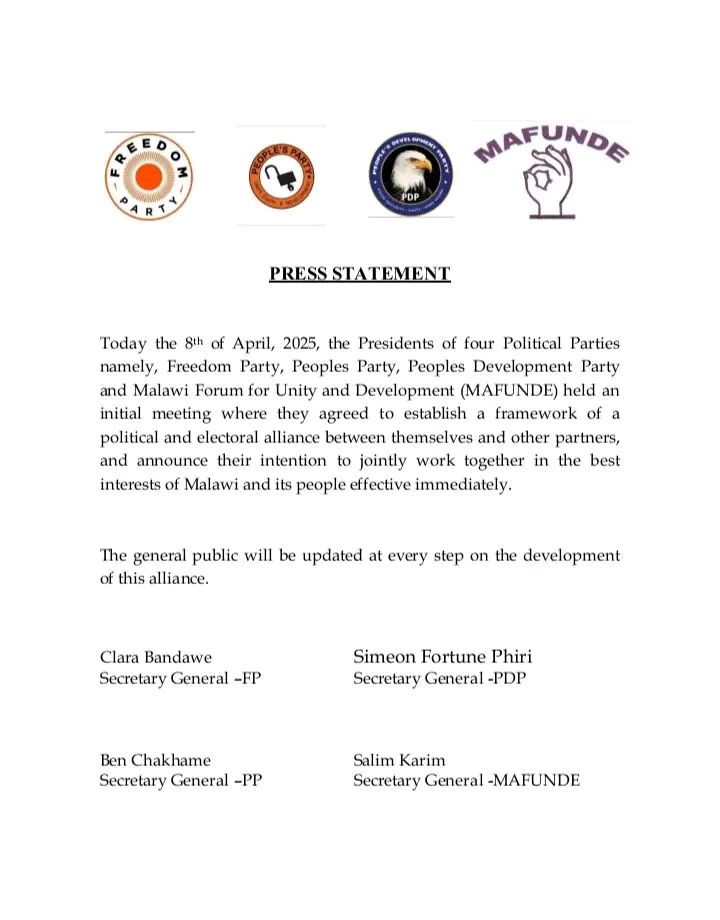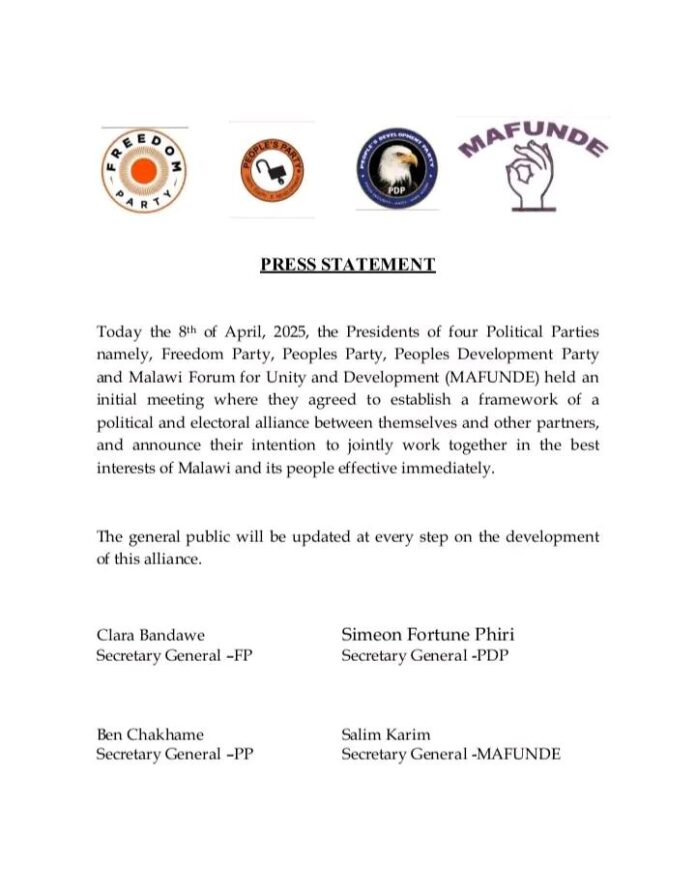By Jones Gadama
In a surprising move, several small political parties in Malawi have agreed to form an electoral alliance, despite concerns over their viability and lack of structures.
The parties involved are the Freedom Party, People’s Party, People’s Development Party, and Malawi Forum for Unity and Development.
These parties are considered “briefcase parties,” meaning they exist primarily on paper and social media, but lack a strong grassroots presence.
This has raised questions about their ability to effectively compete in the upcoming elections.

According to insiders, the President of the People’s Development Party (PDP), George Malemia, also known as Kondwani Nankhumwa, has joined the discussions with a clear stance: he will only participate in the alliance as the president and will not accept any position as a running mate.
This development has raised eyebrows, as it suggests that Malemia is prioritizing his own ambitions over the potential benefits of a united opposition.
Joyce Banda, a former president of Malawi, has reportedly not expressed any interest in having a position. Her position is seen as a strategic move to bolster her political profile and potentially secure a key role in the government.
Meanwhile, Khumbo Kachali, former vice president, is said to be vying for the running mate position.
George Mnesa, a prominent figure in the Mafunde faction, has indicated that he would be comfortable with a senior ministerial post if the alliance wins the elections.
This move is seen as an attempt to secure a position of influence within the government, rather than a genuine commitment to the alliance’s ideals.
The formation of this alliance has sparked concerns about the potential for infighting and the lack of a clear vision for the country.
With the elections looming, it remains to be seen whether this alliance will be able to overcome its internal differences and present a united front to the voters.
As the political landscape in Malawi continues to evolve, one thing is clear: the next few weeks will be crucial in determining the fate of this alliance and the future of the country.
Will the parties be able to put aside their differences and work towards a common goal, or will their individual ambitions tear the alliance apart? Only time will tell.
The absence of the Democratic Progressive Party (DPP) from these discussions has also raised questions.
The DPP is one of the major political parties in Malawi, and its exclusion from the alliance has sparked speculation about the motivations behind this decision.
Some analysts believe that the DPP’s absence may be a strategic move to weaken the ruling MCP further.
Others argue that the DPP may be waiting for the right moment to strike a deal with other parties or to launch its own campaign.
Whatever the reasons, the formation of this alliance has set the stage for a complex and potentially contentious election season in Malawi.
As the country heads into the polls, one thing is certain: the stakes are high, and the outcome will have far-reaching implications for the future of Malawi.
In the midst of these developments, the people of Malawi are left to wonder what the future holds for their country.
Will the electoral alliance be able to overcome its internal differences and present a united front to the voters? Or will the individual ambitions of its leaders tear the alliance apart?
As the world watches, the fate of Malawi hangs in the balance. The next few weeks will be crucial in determining the course of the country’s history.
Will the alliance succeed in its bid for power, or will it falter under the weight of its own internal contradictions? Only time will tell.
The story is still unfolding, and it remains to be seen how the electoral alliance will fare in the coming weeks.
One thing is certain, however: the people of Malawi are eagerly watching the developments, and their futures hang in the balance.



